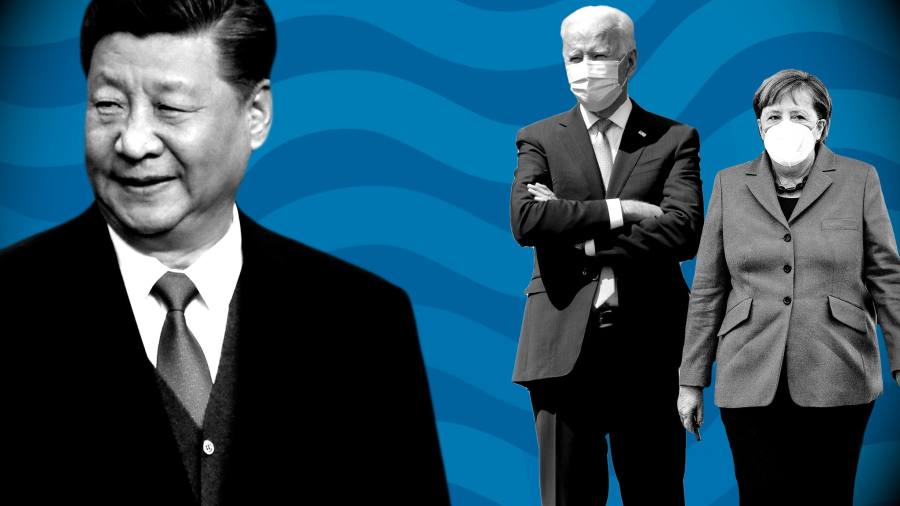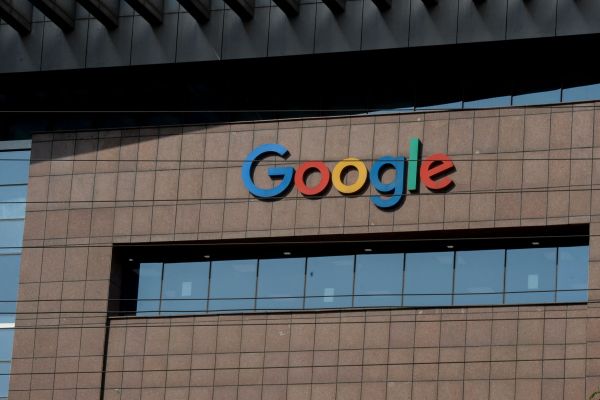[ad_1]
Ever since he entered the White House in January, Joe Biden has articulated one foreign policy goal above others — to work with allies to restrain China.
After the drama and tantrums of the Trump years, when the US talked tough on China but also picked fights with its closest partners, Biden has been trying to stitch back together Washington’s global coalition, with Beijing as its main focus.
Biden spelt out the project in February when he told the Munich Security Conference that the US, Europe and Asia had to “push back against the Chinese government’s economic abuses and coercion”.
The Biden plan has had some success in Asia, where common ground has been found with countries such as Japan, South Korea and Australia.
But as the president prepares for his maiden overseas trip, he faces the most delicate task yet — trying to coax a wary Europe to work more closely with Washington on China.
Biden will attend the G7 in Cornwall in the UK on Friday, before heading to Brussels for Nato and EU-US summits next week. He will then fly to Geneva to meet Russian president Vladimir Putin.
Beneath the likely statements of unity, Biden will have to deal with an awkward reality, warn diplomats and officials. While the EU has become more hawkish on China, it has different economic and strategic priorities from the US and there is a constant risk of those divisions breaking into the open.
“They are rightly taking into account EU concerns and try to avoid the kind of public and unhelpful stand-offs that the Trump and Pompeo administration cherished,” says one senior EU diplomat. “But the reality is that we are not 100 per cent aligned, and the Chinese know it.”
Several people familiar with the pre-summit negotiations say Biden hopes to forge like-minded coalitions to rebuke China over its crackdown on the pro-democracy movement in Hong Kong, repression of Uyghurs, aggressive military activity in the South and East China seas, and use of economic coercion to retaliate against critics.
The G7 will discuss ways of boosting infrastructure projects in medium and lower-income countries to try to counter China’s Belt and Road Initiative. Meanwhile, the EU and US want to find ways to co-operate on issues such as the sale of sensitive technology to China.
The different capitals are grimly aware of the need to show unity after the bitter brawls of the Trump years, as they try to send a clear message to China that they will be harder to divide.
But Biden will have to tread carefully for fear of alienating allies — most notably German chancellor Angela Merkel — who are wary of cold war-style rhetoric aimed at China. One European official says some EU countries do not like the term “adversary”, which is often used in Washington to refer to Beijing.
Noah Barkin of research group Rhodium Group says that while the US and EU share many concerns about China, they had different views on how to respond. “Europe has its own interests,” he says. “There is not going to be seamless co-operation on China.”
Systemic rival
Over the past two years, Europe has gone through a gradual but substantial re-evaluation of relations with China, as leaders respond to the more authoritarian approach of President Xi Jinping, which has been exacerbated by the abrasive tactics of Beijing’s “wolf warrior” diplomats.
Several European countries, including the UK, France and Germany, have become more willing to send navy ships to the South China Sea to reinforce the US message to China about freedom of navigation.
While the US does not expect them to help in the case of a conflict over Taiwan — in contrast to the situation with defence treaty allies such as Japan — the symbolism shows China that the US is not alone.
The EU’s increasingly assertive stance on China was underscored by the European parliament’s recent decision to put ratification of the bloc’s proposed investment treaty with Beijing on ice. That came after Beijing slapped retaliatory sanctions on EU politicians and institutions, in response to co-ordinated punitive measures imposed by the European bloc, the US, UK and Canada on Chinese officials over the treatment of Uyghurs in northwestern Xinjiang province.
The withering of the so-called 18+1 group of central and eastern European states and China is another example of the growing gap between the EU and Beijing. The group, including 12 EU states, was once seen as a way for smaller members to get Chinese investment and time with top officials. Now Lithuania has publicly repudiated the initiative and other EU countries are distancing themselves from it.
Europe’s evolution on China was highlighted in a 2019 paper that described Beijing as a partner and economic competitor in some areas, but called China a “systemic rival” for the first time. Germany’s BDI corporate lobby released an unexpectedly hard-nosed paper the same year that called for a tougher European approach to unfair business practices.
At the same time, Brussels has amassed new tools to defend European interests against perceived overseas threats, especially from China. Among the most prominent recently has been the tabling of legislation permitting the commission to crack down on state-owned enterprises from outside the EU, as well as plans to force companies to end abuses within their supply chains.
Wendy Sherman, US deputy secretary of state, said during a recent trip to Brussels there had been a “sea change” in how Europe viewed China.
“We have made quite a lot of progress with Europe on China,” says a senior state department official. “The co-ordinated sanctions on Xinjiang were a huge deal. If you had asked me six months ago if I thought Brussels, Ottawa, London and Washington would join together on human rights sanctions against China, I would have bet against it.”
Technological front
But the issue facing Biden is how to translate that change in mood into tangible co-operation. In one of the easier challenges, both sides are eager to enhance co-ordination on the selection of top officials for key international bodies to prevent China from gaining more power.
At the EU-US summit, the intention is to launch a Trade and Technology Council to boost co-ordination on 5G, semiconductors, supply chains, export controls and technology rules and standards. This would be a marked shift from the Trump era when Brussels was repeatedly wrongfooted by US presidential initiatives targeting China.
Yet while technology is seen as one of the most important areas to counter China, Martijn Rasser, a former CIA expert now at the Center for a New American Security think-tank, warns against expecting quick results given the complexity of global supply chains.
“The semiconductor industry is highly globalised and the supply chains are highly complex. And it also something that just the US and EU cannot sort out,” he adds. “You have to engage with Japan, South Korea, and Taiwan is a key player.”
One EU official cautions that there are still significant ongoing transatlantic differences over technology. The question was whether the EU and US could “get over differences on data protection and big data content, and focus on the conditions that will allow us to prevail technologically in the geopolitical great power competition”, the official says.
Tensions over semiconductors highlight how difficult this will be. The Dutch company ASML dominates the market for the advanced machines needed by Chinese companies to make high-end chips needed for devices such as smartphones.
But ASML has been unable since 2019 to obtain a licence from the Dutch government to export its extreme ultraviolet lithography equipment to China’s Semiconductor Manufacturing International Corporation, the country’s biggest chipmaker, according to people familiar with the matter. Biden on Thursday banned Americans from investing in 59 Chinese companies that included SMIC.
The Netherlands has not disclosed the reason for the licence freeze, but people familiar with the matter say the Trump administration successfully lobbied the Dutch government because of concerns about the potential for EUV technology to help the Chinese military develop advanced weapons. ASML says it fully understands that the Dutch foreign ministry needs time to reach a decision “given the current geopolitical landscape and rapidly changing international legislation”.
Sigrid Kaag, the Dutch trade minister, said last month that the ASML case was under “continuous” review. “It’s obviously a fine line but we want to remain an open trading nation, so we are in continuous dialogue with our allies on this as this is a very particular and . . . sensitive case,” she said.
Kaag said the EU needs to “team up” with the US to address many points of agreement on China, but that would require the bloc “to get its act together” and co-ordinate better between its various institutions to avoid contradictory outcomes in its China policy.
No binary choice in Berlin
In Germany, which counts China as its biggest trading partner, business opinion has in recent years hardened. Small- and medium-sized companies face a struggle to defend their intellectual property rights from industrial espionage and they are watching Chinese competitors snap up European rivals.
While the US has sometimes criticised Germany’s stance towards China, suggesting that it does not want to jeopardise its exports, German diplomats have publicly criticised China over its treatment of the Uyghurs.
But Merkel has resisted attempts to push Germany into taking a confrontational posture. When she addressed the Munich Security Conference earlier this year, there was an obvious gulf between her and Biden on China.
Merkel was also the main driver behind the EU’s decision to accept Chinese overtures late last year and rush through the previously stalled China Investment Agreement the month before Biden was inaugurated.
With German elections in September, Merkel is in the twilight of her career. German politicians including Reinhard Bütikofer, a Green MEP who is one of those under Chinese sanctions, see “shifting ground” under Merkel’s feet as German attitudes towards Beijing change.
Yet the chancellor is not alone in opposing any attempts at economic decoupling between China and the EU. Iuliu Winkler, a Romanian MEP who is a member of the centre-right EPP group to which Merkel’s CDU belongs, opposes any notion of a “binary choice” between the US and China.
As such, diplomats say the US has been wise not to overplay its hand when dealing with the EU.
Internal divisions
At his meetings with allies in Europe, Biden hopes to repeat a similar version of the playbook he used when he convinced his first White House guests — Japanese prime minister Yoshihide Suga and South Korean president Moon Jae-in — to publicly support Taiwan.
“If you look at the approach that Biden took with Suga and Moon, the US is also coming to these summits with asks about Taiwan and China,” says Bonnie Glaser, a China expert at the German Marshall Fund.
But while he put heavy pressure on Tokyo and Seoul over the issue, he is expected to take a lighter touch in Europe due to the more complicated dynamics of dealing with a bloc that is internally divided over China.
“The US will try to make sure that the China language at the G7 is as tough as possible, but it’s not going to blow up the boat by pushing to include something like the Wuhan lab virus leak,” says one person familiar with the plans.
Biden should face the least resistance at the G7 after the group’s foreign ministers recently issued a joint statement with an unprecedented broad criticism of China.
But even in that forum, priorities differ. While the UK, France and Germany have slammed Beijing over human rights, Japan is more concerned about China’s military activity in the South and East China seas, and has not for example put sanctions on China over the situation in Xinjiang.
At the US-EU summit, the two sides will struggle to avoid the perception of continued divisions given ongoing difficulties over areas such as the Boeing-Airbus aircraft subsidies dispute that predate the Trump years. With the administration focusing on his Indo-Pacific strategy, some experts argue that Biden has to make a stronger case for US-EU relations.
“The Biden administration has a pretty good idea of what it wants from Europe, which is to go along with their China policy,” says Tom Wright, a foreign policy expert at the Brookings Institution. “They are less clear about what they type of Europe they want. Ultimately, if Biden wants a Europe that competes with China he will have to change how the US thinks about the EU, strategic autonomy, burden sharing, and trade.”
While enthusing about the benefits of deeper co-operation, EU officials and diplomats complain that they have so far only seen a relatively thin array of US proposals for specific outcomes from the summits. They also point to a continued tendency in Washington to announce initiatives without prior consultation with the EU. One example is Biden’s unexpected decision to advocate a waiver of intellectual property rights for Covid-19 vaccines.
While Europeans have strongly welcomed the thaw with the election of Biden, some mutter darkly about what might come in four years, particularly with Trump threatening to run again for the White House.
One official says the European mood was like when Barack Obama was elected after US-EU relations had significantly deteriorated under George W Bush, but “this time with a hangover”.
The official adds: “No one is partying.”
[ad_2]
Source link







